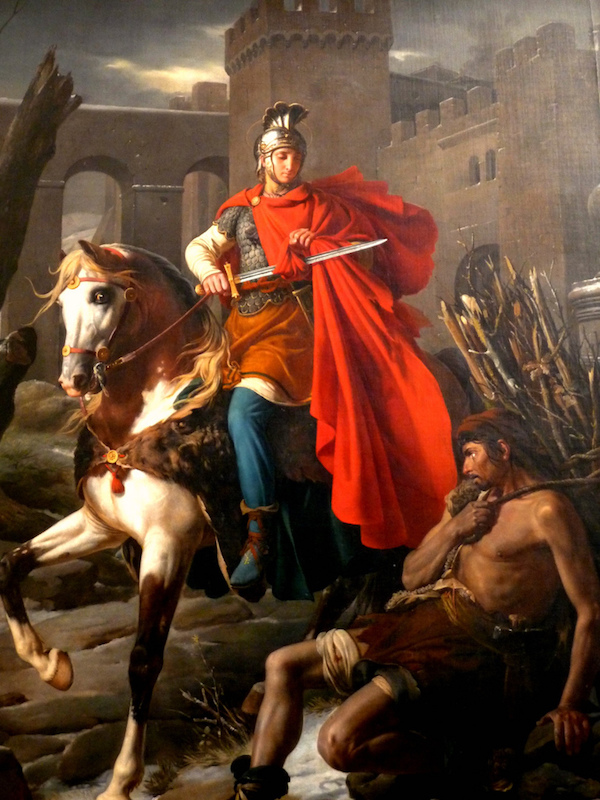November is often hard for me: the end of daylight saving time leaves me waking up at what the world says is an hour earlier and my allergies have led me to dub this time the Season of Sneezin’. But it’s also a bittersweet start to the month of November, as we commemorate the feasts of All Saints and All Souls. I always place my dad’s name on the ofrenda for All Saints’ Day, and remember the good times of my childhood with him. November 14th is also my late dad’s birthday.
In between those two dates is another memory related to my dad: on Veterans’ Day, November 11, 2002, my father was awarded his high school diploma in his hometown, 61 years after he made the decision to drop out of high school and join the Navy after the attack on Pearl Harbor. He was one semester short of graduation, but chose to volunteer rather than wait to be drafted. Years later, the state of Oklahoma passed a law in the wake of the September 11 attacks allowing those in my dad’s situation to be awarded a true high school diploma, and it was an amazing presentation that the Hobart School district put on to celebrate this long-awaited milestone. The entire school district celebrated my dad and another man who had similarly dropped out to fight against fascism, on that Veterans’ Day seventeen years ago.
I was not raised in traditions that observed holy days like the Feast of All Saints, but I am grateful for the beautiful remembrances that the observation of this feast affords me. And it was only after I was called to the parish which I serve, named in honor of St. Martin of Tours, that I discovered another saintly connection to Veterans’ Day.
As I was doing research last year for my first sermon on our parish’s patronal feast of St. Martin’s Day, I did a good bit of research into St. Martin, whose feast day is, I was reminded, November 11. Besides being my first St. Martin’s Day among my parishioners, it was also the 100th anniversary of the end of what is now known as World War I—a war that shook Europe and much of the world to our modernizing foundations. I discovered that the alignment of St. Martin’s Day with what we now call Veterans’ Day is no accident.
St. Martin was the son of a Roman officer, born around 330 CE in Hungary but raised in Italy. When he was a young man, even though he had become interested in becoming a Christian at age 10, he followed his father into the Roman army. The legend is that he encountered a beggar and was moved to draw his sword to cut his military cloak in half to share it with the man. He then had a dream that night of Jesus wearing half his cloak, praising Martin, even though only a catechumen, and he awoke to find the cloak restored.
This caused him to realize that his military service for Rome was inconsistent with Jesus’s call to him. He petitioned to be released from his duty as he felt called to be “Christ’s soldier.” He was accused of cowardice, even after he offered to stand in the front of the battle armed only with a depiction of the cross. He was imprisoned, but eventually was discharged, and eventually made his way to France where he followed St. Hilary of Poitiers. He was known for his humility, his willingness to sacrifice, and his devotion to duty as well as to his conscience.
It’s no wonder, then, that St. Martin is both the patron saint of soldiers and of conscientious objectors; he is the patron also both of winemakers and of recovering alcoholics. He is a contradiction, just as my father was. And his feast day was widely celebrated throughout Europe in the past, with children singing carrying lanterns, going door to door for candy or other treats on St. Martin’s Eve. His feast used to signal the beginning of a period of forty days of fasting before Christmas that now has been shortened to the length of Advent.
Furthermore, his feast day was a traditional day on which to sign peace treaties, given that he had laid down his arms and risked much for his conscience in the name of peace. Some claim that it was mere coincidence that the leadership of the warring nations involved chose St. Martin’s Day as the day the armistice in World War I officially began. But I love the symbolism that the thirty-two nations involved in this terrible struggle laid down their arms on this feast day of St. Martin, much as St. Martin himself renounced his participation in warfare centuries before.
The horrors of World War I led to a worldwide movement of renouncing offensive war which sadly was all too brief; at the same time, the peace ultimately imposed in that war’s aftermath very well may have sowed the seeds for World War II. But the holy day of remembrance of St. Martin calls us always to selfless service of others in the name of the oppressed and the poor, and challenges us to honor veterans in the best way possible—to dedicate ourselves to the idea of renouncing war in the name of the love of Christ. As we approach that holiday next week, let us take seriously the cause of peace, so desperately needed in a time such as this.
The Rev. Leslie Scoopmire is a retired teacher and a priest in the Diocese of Missouri. She is priest-in-charge of St. Martin’s Episcopal Church in Ellisville, MO. She posts daily prayers at her blog Abiding In Hope, and collects spiritual writings and images at Poems, Psalms, and Prayers.

